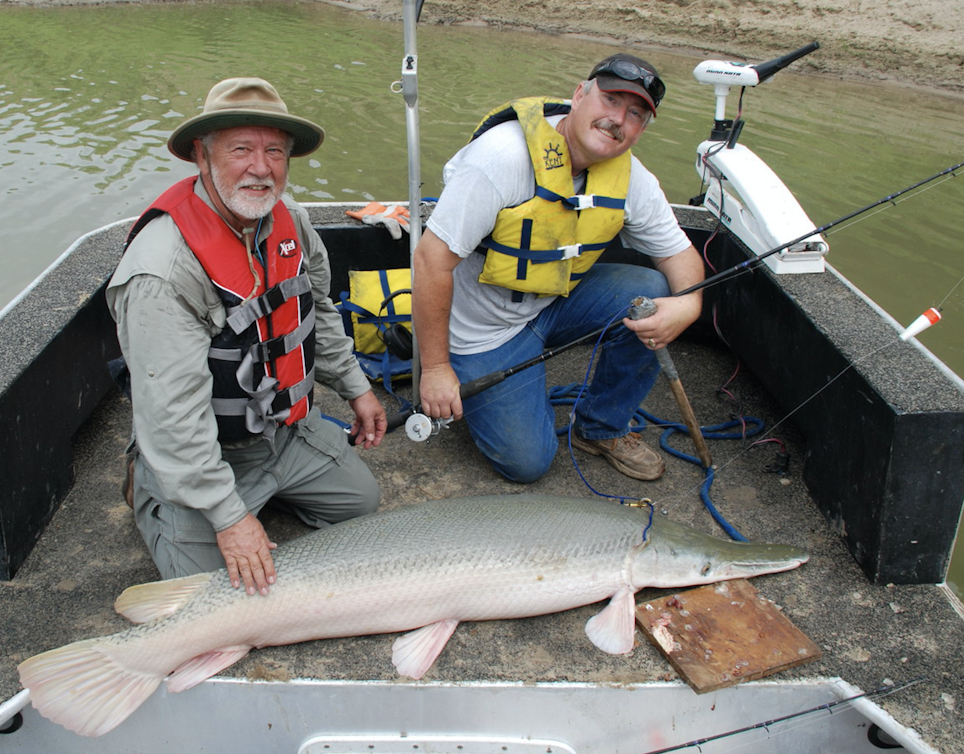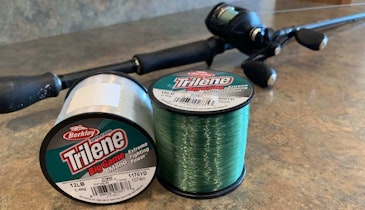
Rod-and-reel and bowfishing anglers prize 100-pound-plus alligator gar like this one from the Trinity River. (Photo: Larry D. Hodge Texas Parks and Wildlife Department)
A prehistoric beast found in the Trinity River and some other Texas waterways could be getting some more protection from the Texas Parks and Wildlife Department.
The agency has proposed several changes to help protect the state's largest and longest-lived freshwater fish. Among the proposals is a statewide ban on nighttime bowfishing for alligator gar, from 30 minutes after sunset until 30 minutes before sunrise. A state official says "the rapid evolution of technology and equipment" is cause for concern.
The proposals are scheduled to be voted on at the Texas Parks and Wildlife Commission meeting March 20 in Austin.
Alligator gar are popular targets for bowfishermen and traditional rod-and-reel anglers in Texas. According to the Encyclopedia of Alabama, "alligator gar was first described by French naturalist Bernard Germain de Lacépède in the fifth volume of his five-volume Natural History of Fishes, published in 1803. Its common name refers to its resemblance to the American alligator."
Alligator gar have tough, rugged scales that interlock and give the fish an incredibly tough "skin." The scales are so hard that Native Americans used them in various ways, including as arrow tips. They breathe with a modified swim bladder that allows them to stay underwater for long periods and take in air on the surface.
Alligator Gar Proposals
Texas Parks and Wildlife Department officials have proposed changes that will help with conservation management efforts. Included are proposals to:
— prevent overharvest of older, mature alligator gar
— fill data gaps through mandatory harvest reporting
— allow for limited opportunity to harvest large alligator gar from the Trinity River by creating a drawing system.
The first of four components of the proposed regulation changes include instituting a 4-foot maximum length limit on the Trinity River. No alligator gar over that length could be harvested (kept) from the Trinity River from the I-30 bridge in Dallas downstream to the I-10 bridge in Chambers County, including the East Fork of the Trinity River upstream to the dam at Lake Ray Hubbard.
“The TPW Commission has communicated to us that they would rather, out of an abundance of caution, act proactively to further limit harvest of older, mature alligator gar while populations are in relatively good shape,” said Craig Bonds, TPWD Inland Fisheries Director. “The 4-foot maximum would conserve these larger fish and redirect harvest towards younger, more abundant smaller fish. It also ensures there are plenty of large, recreationally-valuable fish remaining for anglers to catch and release, which attracts anglers from around the world.”
The tag drawing would allow selected anglers to harvest one alligator gar more than 48 inches in length per year from the Trinity River. The limited entry system would allow non-transferable harvest authorization for a set number of alligator gar. Authorizations would be selected and distributed through a limited random draw of interested applicants.
“The drawing is similar to what other states, like Arkansas, are doing to offer an opportunity to keep one large gar while allowing the Department to manage annual harvest to avoid a population decline and depletion of the large alligator gar,” Bonds said. “Alligator gar could be harvested by lawful means, including pole-and-line or by bow fishing equipment.”
Bowfishing Proposal
The final two proposed rules would be in effect statewide.
A proposed regulation change would prohibit nighttime bow fishing statewide for alligator gar 30 minutes after sunset to 30 minutes before sunrise. This includes both take and possession using lawful archery equipment including crossbows during those nighttime hours.
“The TPW commission has concerns about the rapid evolution of technology and equipment used to target large alligator gar,” Bonds said. “Prohibiting nighttime bow fishing for alligator gar is an additional proactive measure that would be taken to protect populations from overharvest.”
Check-In System
The last component of the proposed regulation changes would require all anglers harvesting alligator gar statewide to report their harvest within 24 hours online or through a mobile app, similar to what is currently required for eastern turkeys. This system would give TPWD more data on alligator gar numbers to try to ensure quality fishing for future generations of anglers.
Statewide, a one-fish-per-day bag limit would remain in effect, and at Falcon International Reservoir, the daily bag limit of five fish and possession limit of 10 fish would also remain in effect. Falcon would also be exempt from the harvest reporting requirement.
“We are proposing to exempt Falcon from mandatory harvest reporting as this lake appears to have a robust population of alligator gar so that information is not needed at this time to manage that particular fishery,” Bonds said.
All of the proposed rules will be available for review in the Texas Register on Feb. 15.





